17-18 July
If you are wondering about the curious title, just hang on……
I have been meeting with some of the public health related faculty at Kings College London (KCL) as I previously reported. They include: Dr. Peter Duncan, my academic sponsor; Dr. Margaret Sills, Academic Director of the Higher Education Academy (Health Sciences and Practice) and Dr. Ann Wylie, Health Promotion Lead, KCL Undergraduate Medical Education Team, General Practice and Primary Care.
I don’t want to report further on individual conversations, but I would like to update everyone on the gist of the discussions as they occur.
Most recently I had a long conversation with one of these faculty about the potential role for the academic sector in social marketing research and training. The question is, if social marketing is wildly successful in England (as it well might be) who is going to train the public health professionals in this approach to project planning and intervention? I believe that there is a real strategic role for academia in this, both in the UK and in the US—one that I am not sure is fully envisioned.
What I did find is that there is a project at the English Dept of Health (DH) that is mapping out all the places where public health is being taught—maybe even what is being taught in each program. This would be a good place to start. I also discovered that there is a network of regional directors of public health teaching in England (everything seems so organized over here!) that could be brought in as partners to the social marketing effort. Most public health professionals are “certified” in England by the Faculty in Public Health (I am still trying to get all the names and acronyms straight); so it might be possible to explore getting social marketing included as one of the basic competencies in public health, or to have it included as one of the benchmark criteria used to regulate the profession. I don’t have all the details right, but the general plan is correct. I plan to follow up on this at the NSMC next week.
Also, I attended an informal discussion group sponsored by DEMOS, a London think-tank specializing in public health and policy work. The presenter, Perri, did an analysis of the behavior change related policies of may English government departments. Using a very conservative and restrictive methodology, he found that that DH had the most policies, followed by education and a few others. Some departments had none. He also looked at whether these policies were extensive and intensive (coercive) and constructed a “bossiness” index. He found that the social departments were twice as “bossy” as the other, most focused on the poor and low income populations and that they did not focus on policies where there was a significant economic “risk transfer” to the general population. Many of these policies and programs were communications campaigns to persuade (or dissuade) the target public from some behavior.
This report prompted a lot of discussion, including whether or not it matters about the programs unless we know how effective they were. In other words, is government really bossy and intrusive if the programs don’t really work? Good questions….and many others that I didn’t take notes on.
Once again I found it interesting that the same issues about policy, politics, government responsibility vs individual responsibility, effectiveness, paternalism, community duty, etc., etc. become issues in both England and the US—in spite of the differences in our governmental structures and cultures
Oh yes, the “eye” part……….The British Airways London Eye is the world’s tallest observation wheel—raising 135 meters above the bank of the River Thames across from Parliament. Linda and I took a bus to Waterloo, walked down to the river by the Royal Performance Center and took a ride on the Eye (15 pounds each). It is a wonderful experience and truly provides a bird’s eye view of London, one that is completely different from the ground level perspective. It moves slowly and without a perceptible vibration or a feeling of being up high. It is more the feeling a soaring in the air. Maybe that’s why the attendants say “Have a good flight” when people get on.
###
Thursday, 19 July 2007
Subscribe to:
Post Comments (Atom)




















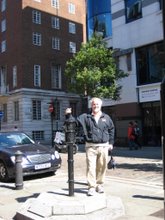
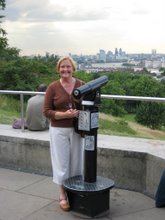
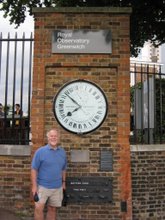
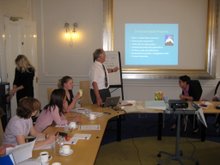
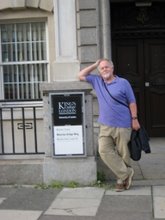




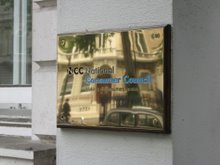
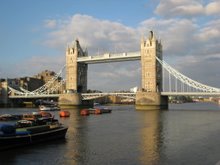
No comments:
Post a Comment